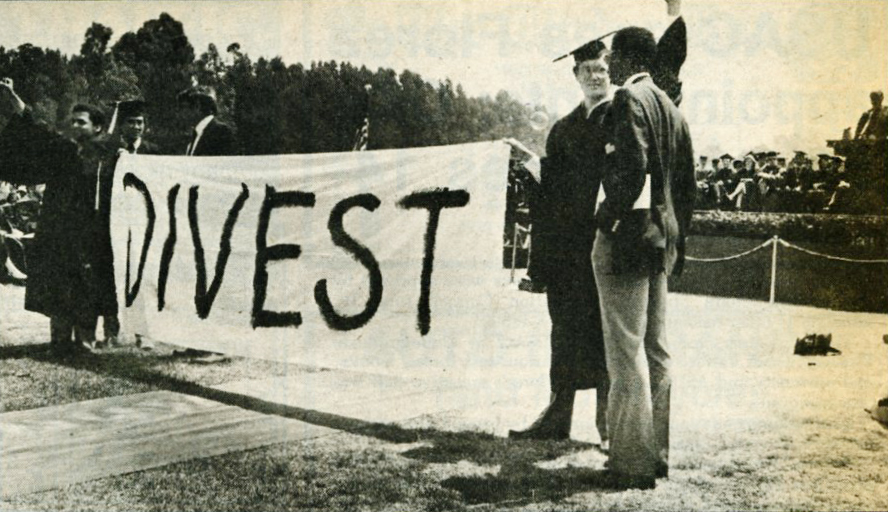Maia Ferdman: UC divestment should be independent of US policy

Top: Students hold a banner advocating UC divestment from South Africa at UCLA’s commencement ceremony in June 1986. UC police later confiscated the banner.
Bottom: Los Angeles Mayor Tom Bradley and U.S. Senator Alan Cranston joined student protestors at a Westwood Plaza press conference outside the UC Board of Regents meeting to denounce South African apartheid in 1986.
By Daily Bruin Staff
April 2, 2013 12:00 a.m.

When it comes to the Israel-Palestine conflict, it seems that time runs in a loop.
The tensions, protests and arguments surrounding the conflict frequently spill over to University of California campuses, where year after year we see similar posters and flyers, facts and figures, events and counterevents.
In the most recent development in campus advocacy relating to the Israel-Palestine conflict, UC San Diego’s undergraduate student government, following closely behind those at UC Riverside and UC Irvine, passed a resolution calling for UC divestment from companies doing business in Israel and profiting from the Palestinian occupation.
However, this resolution is unlikely to translate into actual policy.
According to a May 2010 statement, the Regents will only divest from a foreign government or affiliated companies if the United States declares that the government is committing acts of genocide.
This renders the divestment from Israel and affiliated companies somewhat infeasible.
In the particular case of the Israel-Palestine conflict, the issue at stake may be too divisive for the UC to take a stance on investments in the region. But there are other international affairs with less political and social subjectivity, and the 2010 statement prevents the UC from speaking out on these issues.
Israel-related arguments aside, perhaps recent divestment resolutions on UC campuses present an opportunity to reexamine the UC’s divestment policy.
Such a specific policy is effective in that it regulates the monetary investments of the UC, shielding them from passing social trends. Ultimately, however, it limits the University’s ability to take a stance on a broader range of human rights issues, particularly when they lie outside of the federal government’s judgement.
Economic sanctions have historically been an important form of protest in response to human rights abuses.
Today, proponents of Israel-related divestment have pointed to UC divestment from apartheid South Africa as a successful case in which the UC took a moral stand on human rights abuses.
But the historical account is not so clear-cut. Regents initially opposed South African divestment due to financial concerns within the University, but reversed their position a year later. They attributed their change of heart to worsening conditions in South Africa, specifically the detainment of 3,000 black South Africans in June 1986, who were not granted due process.
The regents’ final decision, urged by then-California Governor George Deukmejian, was based on a moral outcry against the South African system of apartheid.
Since then, UC policy for divestment has become more narrow. The most recent UC divestment decision came in 2006, against companies the U.S. government claimed supported a Sudanese government steeped in civil war and genocide.
There are many human rights issues that do not fall under genocide, yet are a worthy cause for divestment. South African divestment, for example, would not have passed under this current policy.
At the time, the United States did not associate South Africa with genocide, but rather maintained a policy of constructive engagement, keeping economic ties with the country, while still publicly encouraging it to reform its apartheid policies.
Other cases could also enter grey areas: for example, the United States did not and still does not recognize the Armenian genocide as such. A state’s geopolitical interests often interfere with how it recognizes human rights abuses or international conflicts. The UC does not necessarily have to abide by those same interests.
The Israeli case calls for a different analysis than that of South Africa – like any conflict, it has many moving parts and conditions unique to its history, from the contested nature of terms like “apartheid” to the numerous political groups involved in the protracted armed conflict.
However, the regents’ current investment policy stunts the conversation. It effectively defers their investment decision-making to U.S. government stances, which, in some sense, might prevent divestment as a result of national interests, not UC-specific judgements.


